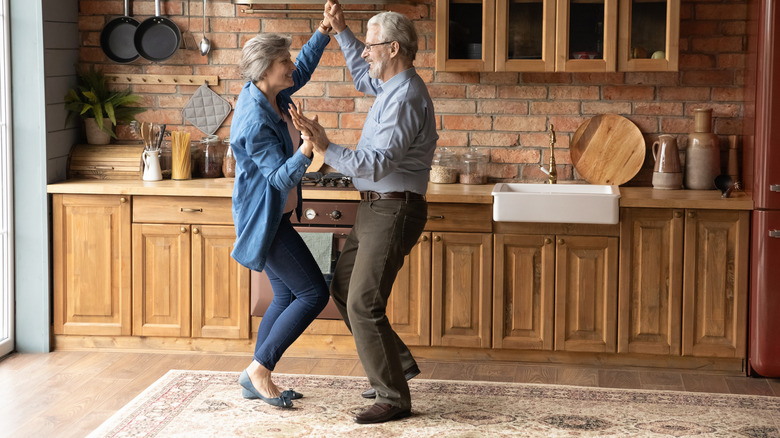How Your Attitude Towards Aging Can Influence Your Health As You Get Older
It's long been known that eating well and being active can help reduce the risk of age-related health problems (via PLOS Medicine). Now there's evidence that the way we think and feel about our age might also make a difference.
The adage "you're only as old as you feel" may bear some truth, say researchers. Having a more positive outlook on one's own age and the process of aging in general has been associated with better physical and mental well-being (via The Gerontologist). A negative attitude, on the other hand, has been linked to lower life satisfaction and poorer self-reported health.
According to a study from the journal PLOS One, older people who held negative stereotypes about getting older were slower at walking than those with more positive views. Various factors were accounted for, including the medications that people were taking, their general mood, and their health at baseline. This is significant because a slower walking speed is associated with a greater risk of hospitalization and death.
In another study published in Personality and Individual Differences, physically frail participants who had negative attitudes about aging exhibited worse cognitive abilities than those who did not. A 2018 study that followed 260 older adults for 12 years echoed similar findings (via Psychology and Aging). The researchers discovered that people who hold negative perceptions of their own aging are more likely to develop mild cognitive impairment over time compared to others.
What happens when we internalize age stereotypes?
Negative perceptions of aging exist across various cultures (via Psychology and Aging). In a study published in The Gerontologist, Dr. Becca Levy suggests that an "age-stereotype paradox" has developed in the US over the years. She argues that people's ideas about getting older should be increasing in positivity as time goes on, and yet the opposite tends to be true. The reason for this is that our culture propagates numerous unhelpful expectations about aging. For example, we assume that our health will naturally deteriorate, our friendships will diminish, and that we won't be able to enjoy the same activities as before.
Research shows that these limiting beliefs are almost self-fulfilling (per International Psychogeriatrics). People who buy into them are more likely to experience various health issues. Interestingly, people who internalize more positive stereotypes about the aging process appear to do better both mentally and physically than others.
Changing the narrative about aging
Aging is much more flexible and malleable than previously thought, say researchers (via American Psychologist). Getting older doesn't necessarily have to be wrought with illness and loss. Instead, we can grow in emotional stability, creativity, and strength. In fact, studies show that many people gain greater well-being and life satisfaction as they mature (per Psychology and Aging).
Ultimately, aging is a diverse experience that isn't uniform across older people. We have more control over the way we age than we've been led to think. Our lifestyle choices play a big role, as does our mindset (via Age and Ageing). The World Health Organization points out that older people who have more positive views of aging recover better from disability and live nearly eight years longer, on average.
It's important that the media, clinicians, policymakers, and society as a whole, work together to dismantle unhelpful stereotypes about aging, which negatively impact people's health and quality of life. It's time that we begin to construct a new narrative about what it means to get older.



